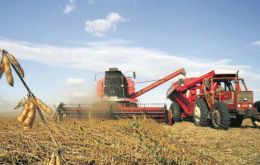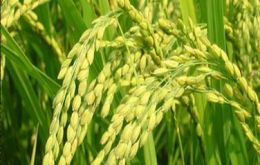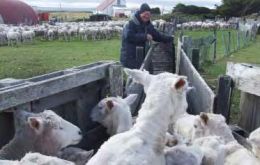MercoPress. South Atlantic News Agency
Agriculture
-
Tuesday, August 16th 2011 - 06:23 UTC
Mozambique offers Brazilian farmers 6 million hectares to develop agriculture

The Mozambique government is providing large tracts of land at a symbolic price to Brazilian farmers to produce soy, maize and cotton, Mozambique’s agriculture minister, José Pacheco told Brazilian newspaper Folha de Sao Paulo.
-
Tuesday, August 16th 2011 - 06:19 UTC
China wants to buy directly from Brazilian farmers, avoid intermediation

China, the second-largest buyer of soy in the world wants an end to intermediation by US multinational companies working in the sector and plans to invest purchasing directly from farmers in Mato Grosso and another five states in Brazil, according to the Brazilian press.
-
Monday, August 15th 2011 - 11:56 UTC
USDA estimates Argentine 2011/12 wheat crop at 13.5 million

The coming 2011/12 wheat crop of Argentina will reach 13.5 million tons instead of the 15 million forecasted last July, reported the US Agriculture Department, USDA.
-
Thursday, August 4th 2011 - 06:28 UTC
Uruguay soy crop reached 1.5 million tons with average yield of 1.788 kilos

Soybean was king of corps in Uruguay last summer with 1.5 million tons planted in 862.000 hectares and with an average yield of 1.788 kilos per ha, according to the latest data from the country’s Agriculture Statistics Office, DIEA.
-
Friday, July 29th 2011 - 10:35 UTC
Brazil begins exporting rice to South Africa, competing with Thailand

Brazil has begun shipping rice to South Africa, competing with Thailand, the largest source of the grain for Africa’s largest economy. A shipment of rice from Brazil’s Santa Catarina state left Santos bound for South Africa this week.
-
Wednesday, July 27th 2011 - 03:48 UTC
Argentine farmers furious with government’s wheat export policy

Argentina liberated 450.000 tons of wheat for export, a decision which is believed to be closely linked to Sunday’s election in the farming province of Santa Fe where the government of President Cristina Fernandez de Kirchner suffered a major defeat.
-
Wednesday, July 20th 2011 - 09:22 UTC
Reduced Chinese import makes and cheaper palm oil, see G-3 exports fall

Soybean processing and exports from the US, Argentina and Brazil, the largest shippers, were below expectations in the second quarter on reduced Chinese imports and competition from palm oil, Oil World said in a Tuesday released report.
-
Tuesday, July 19th 2011 - 06:05 UTC
Brazil to cut ethanol content in gasoline to ease pressure on sugar market

Brazil will reduce the ethanol content in gasoline in another effort to contain inflation since sugar (and ethanol) prices because of a poor crop have been soaring, according to the Sao Paulo press.
-
Friday, July 15th 2011 - 06:09 UTC
“Grain prices are more linked to the US dollar than to food demand”

“Saving in US dollars or in soybeans is the same” cautioned Argentine economist Carlos Melconian, who argued that “grain and oilseed prices are more linked to the value of the dollar than to demand for food produce”.
-
Thursday, July 14th 2011 - 19:11 UTC
Faklands government encourages young people to live and work in the Camp

In a bid to encourage young people to live and work in the Camp, the Falkland Islands Training Centre is now offering an Agriculture Apprenticeship following much research and planning that started in early 2010.